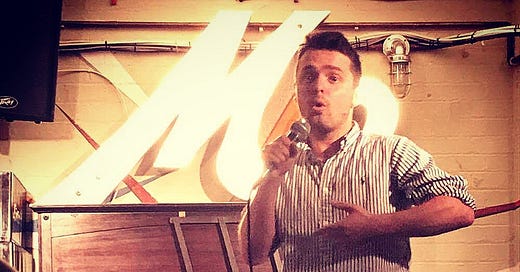Do we find short people as funny as normal height people? Or are we just laughing at, not with, them?
Unfortunately, when it comes to the ability to make people laugh, we short people don’t appear to be quite as good as our taller peers at it. A 2020 study found that the most successful comedians tend to be above-average height - among other commonalities like living in cities and being brought up in large families.
Based on an (albeit very limited) sample of 50 top British entertainers, statistician Dr Geoff Ellis claimed that the ‘funny gene’ is more likely to be found in men over 5’9’’ and women over 5’3’’. Those figures suggest that you don’t need to be taller than average (remember that’s 5’9’’ for men and 5’3’’ for women) to make it as a leading light in comedy, but being excessively short may well be a hindrance.
Then again, Dr Ellis did also include star signs in his analysis, so let’s take it all with a pinch of salt.
According to University of Western Ontario psychology professor and author of The Psychology of Humor: An Integrative Approach, Rod Martin, an idea or an object being out of place - an element of incongruity - is core to humour. It is tempting to think that would lead people to laugh more at short act. If I walked on stage and complained about how hard it was being tall, how bad the weather was up here, that would probably draw some mirth.
Yet incongruity alone does not a punchline make, and there isn’t a lot that confirms that we laugh at short people as much as any other group.
By getting observers to rate humorous statements and drawings made by a group of 200 people, a 2008 study by Daniel Howrigan of the University of Colorado at Boulder found support for the idea that humour indicates intelligence.
That’s not surprising; the level of abstract thinking, creativity and appreciation of the language and tone required to deliver an A-grade punchline might rarely be found in those who would struggle with much simpler literacy tasks. But as we have seen previously, taller children tend to be more intelligent, the trait of intelligence tends to be passed down generations, and the tall tend to present themselves better socially.
Height may also be comedically advantageous because research suggests we are more prone to laugh at people we are either romantically interested in or feel at ease around. Again, in earlier sections, we’ve found that taller tends to be better for those romantic and social gains.
“Studies suggest that being physically attractive means you are found more funny,” writes consultant psychiatrist and senior lecturer at the Institute of Psychiatry, University of London, Dr Raj Persaud. “In other words, you could think you're being attracted to someone because they make you laugh, when, in fact, it's the fact you fancy them which is getting you to giggle.”
Those who are well above the mean height are not prevented from using this as a comedic asset either. Actor and writer Stephen Merchant, a towering 6’7’’, builds much of his solo show Hello Ladies around the struggles of searching for a wife when he is quite so large.
His descriptions of his ungainly movements as “a giant albatross hopping on stilts” and his facial expressions as resembling those of an “elongated Cheshire Cat” are gorgeously self-deprecating ways to acknowledge his physical abnormality on stage.
His stories of how friends have used him as a pillar to regroup at later in a crowd struck a chord with me and my friend Tall Tom’s modus operandi, as did his realisation that he could never have sex standing up “because I’d have to limbo in”, all the while using the microphone stand as a prop to illustrate his loftiness over what the average female height would be.
Merchant won a Golden Globe for his work on sitcom The Office. When a picture of the team picking up that gong at the ceremony appeared in the paper - the first time Merchant had graced the national press - the top of his head was cut off.
Merchant is clearly funny to his bones. As are the likes of Greg Davies ( 6’8’’). Again, his show You Magnificent Beast and a raft of other material through his career pokes a great deal of fun at the hilarities of height differences and bizarre interactions as a lofty individual, from the “tedious” question of how the weather is up there to old women asking him if he would like a job changing light bulbs.
A great number of short people are also similarly witty, yet don’t seem to have shot as high up on the radar in the era where TV appearances are key to exposure as a comedian. I watch a lot of comedy, and the only other name of a short superstar that springs to mind is Lucy Porter. Again, this is almost certainly reflective of a gender bias we have in the world of comedy, as in so many other worlds, as well as a height one.
Punching “do we find short people funny?” into Google at the start of this research was revealing. It didn’t take me to those scientific studies, just to plenty of image galleries of “hilarious” height differences. Short people problems are also discussed, but only through the medium of meme. You are even directed to pages with themed trinkets like mugs emblazoned with slogans such as “I've Had It Up To Here With Short People”. The slogan is on top of an arrow, which - you guessed it - points downwards.
It is not unheard of for comedy acts to play up to the differences in their height. The John Cleese, Ronnie Barker, Ronnie Corbett class sketch from all the way back in 1966 was a prime example of quality execution. The trio stand in line in height order.
"I look up to him [Cleese] because he is upper class, but I look down on him [Corbett] because he is lower class," Barker says. Corbett simply replies: "I know my place."
But for every well-constructed height gag, there are others that are less-delicate, which - justly or unjustly - end up causing offence. TV regulator Ofcom received nearly 100 complaints after one half of presenting duo Ant and Dec, Ant McPartlin, poked fun at his partner’s height.
Here’s how one news report describes the interaction: “This time it was a comedy sketch, called Double Trouble, that caused offence, as Geordie duo Ant and Dec looked for help from adventurer Bear Grylls after they had been cloned.
“A teaser clip for the March 7 episode shows the hosts looking terrified as they chase after a man in a hooded jacket. The mystery man turned out to be Bear and the presenters, who were trapped in horror, asked if the real-life action man was there to save them.
“Ant and Dec asked him: "Have you come to rescue us?"
Bear replied: "No, this thing is way bigger than you."
Ant then cheekily joked as he gestured towards Dec : "Well everything’s bigger than him."”
Not the world’s most artful line, true. It’s hardly equivalent to the verbal dexterity of Stewart Lee; the depth and intricacy of his line that dwarfs would find jobs including “owner-operator of an enchanted beanstalk” unavailable to them stands out for its quality in the plethora of puns about short people.
But it illustrates again that the most frequent comedic use of height is taking a swipe at it. With not a huge weight of direct research in the area, there are only a couple of things I feel confident enough to say here about the role of height in comedy. But Gareth Morinan - a comedian who also happens to be short - says it as well as I ever could in a blog post from a couple of years ago:
“I’m here to convince you of one thing - short people are not funny,” he writes. “Now it’s worth clarifying this because obviously not everyone got the memo about not making fun of people for their physical appearance. Many find the sight of anyone significantly smaller than average unrelentingly hilarious. I’ve had audience members heckle me before I even reach the mic, ‘Look how short he is! He’s bound to be funny!’ Unfortunately for them, most of my comedy has nothing to do with my height.
“It may seem like an odd thing to protest; after all it does arguably make my job as a comedian easier. But quite frankly I don’t like knowing that most people would find it funnier if I replaced all my whimsical intellectual humour with me dancing around on stage in a hat telling hack height jokes.”
That’s about as on the nose as it gets. I don’t think people are laughing with short people when they zone in on that specific characteristic of their physical appearance. They are laughing at them.
People appear to find the simple fact that a difference in two people’s heights exists, full stop, cause for laughter. For additional examples, you can simply refer to clickbait articles like 35 Times Tall People Hilariously Overshadowed Short People that are pretty much ubiquitous online. Just pointing out that one half of a couple is a verified shrimp, and the other a mountain - quite literally in the case of the actor who plays The Mountain in Game of Thrones, pictured with his wife - is enough to inspire the chuckles.
That kind of content is everywhere because it appears to be relatively popular. That particular article was posted a year before I came across it, and had amassed 17,000 likes already. I tried to count all the comments and up votes on the same article, but I got bored a long way before reaching the end, such was the volume of them.
The same website, which I won’t name for fear you will fall into its rabbit hole of nonsense posts and have your brains turned into jelly, also hosts articles on Tall People Problems and Times That People Travelled To Japan And Realized They’re Too Tall For It.
The writers were probably too busy wetting themselves to notice the grammatical errors. Hopefully they will be more aware of what a short person is saying, rather than the potential for photo ops, next time they listen to one trying to make them giggle.






